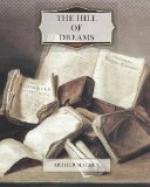“There can be no doubt that the temple of Diana stood there in pagan times,” he concluded, and Lucian assented to the opinion, and asked a few questions which seemed pertinent enough. But all the time the flute notes were sounding in his ears, and the ilex threw a purple shadow on the white pavement before his villa. A boy came forward from the garden; he had been walking amongst the vines and plucking the ripe grapes, and the juice had trickled down over his breast. Standing beside the girl, unashamed in the sunlight, he began to sing one of Sappho’s love songs. His voice was as full and rich as a woman’s, but purged of all emotion; he was an instrument of music in the flesh. Lucian looked at him steadily; the white perfect body shone against the roses and the blue of the sky, clear and gleaming as marble in the glare of the sun. The words he sang burned and flamed with passion, and he was as unconscious of their meaning as the twin pipes of the flute. And the girl was smiling. The vicar shook hands and went on, well pleased with his remarks on the temple of Diana, and also with Lucian’s polite interest.
“He is by no means wanting in intelligence,” he said to his family. “A little curious in manner, perhaps, but not stupid.”
“Oh, papa,” said Henrietta, “don’t you think he is rather silly? He can’t talk about anything—anything interesting, I mean. And he pretends to know a lot about books, but I heard him say the other day he had never read The Prince of the House of David or Ben-Hur. Fancy!”
The vicar had not interrupted Lucian. The sun still beat upon the roses, and a little breeze bore the scent of them to his nostrils together with the smell of grapes and vine-leaves. He had become curious in sensation, and as he leant back upon the cushions covered with glistening yellow silk, he was trying to analyze a strange ingredient in the perfume of the air. He had penetrated far beyond the crude distinctions of modern times, beyond the rough: “there’s a smell of roses,” “there must be sweetbriar somewhere.” Modern perceptions of odor were, he knew, far below those of the savage in delicacy. The degraded black fellow of Australia could distinguish odors in a way that made the consumer of “damper” stare in amazement, but the savage’s sensations were all strictly utilitarian. To Lucian as he sat in the cool porch, his feet on the marble, the air came laden with scents as subtly and wonderfully interwoven and contrasted as the harmonica




